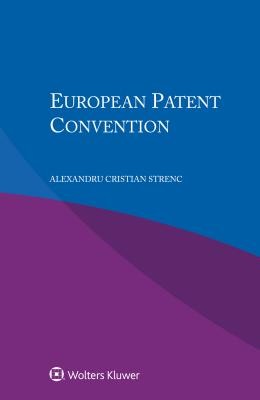
- Išsiųsime per 10–14 d.d.
- Autorius: Alexandru Cristian Strenc
- Leidėjas: Kluwer Law International
- Metai: 2018
- Puslapiai: 170
- ISBN-10: 9403503041
- ISBN-13: 9789403503042
- Formatas: 15.8 x 23.9 x 1 cm, minkšti viršeliai
- Kalba: Anglų
- Extra -15 % nuolaida šiai knygai su kodu: ENG15
Atsiliepimai
Aprašymas
Derived from the renowned multi-volume International Encyclopaedia of Laws, this monograph provides a survey and analysis of the rules concerning intellectual property law in the European Patent Convention (EPC), following generally the structure of the legal provisions, with a special focus on the patentability and patenting procedure. The monograph addresses not only the Convention's core business, but also the work of its coordinating and implementing bodies, the European Patent Organization (EPOrg) and the European Patent Office (EPO).
The concise presentation and interpretation of all relevant texts includes those considered "additional" but which, according to article 164(1) EPC, are in fact integral parts of the Convention - the Implementing Regulation and the Protocols on the Interpretation of Article 69 EPC and on Centralisation, Recognition, Privileges and Immunities, and the Staff Complement. Particular attention is paid throughout to issues arising from the relationship between the EPC and other relevant international and European laws and to recent developments and trends, especially in connection with the unitary patent system. The monograph also includes limited but relevant discussion of the historical development of the bases of the European patent system up to the success story of today.
The analysis approaches each right in terms of its sources in law and in legislation, and proceeds to such legal issues as subject matter of protection, conditions and scope of protection, ownership, transfer of rights, licenses, scope of exclusive rights, limitations, exemptions, duration of protection, and infringement. A broad selection of EPO case law clarifies in the most adequate way the substance of the European patent system, as directly originating from it.
The book provides a clear overview of intellectual property legislation and policy, and at the same time offers practical guidance on which sound preliminary decisions may be based. Lawyers and patent attorneys representing parties with interests in the European Patent Convention will welcome this very useful guide, and academics and researchers will appreciate its value in the study of comparative intellectual property law.
EXTRA 15 % nuolaida su kodu: ENG15
Akcija baigiasi už 6d.05:12:19
Nuolaidos kodas galioja perkant nuo 10 €. Nuolaidos nesumuojamos.

- Autorius: Alexandru Cristian Strenc
- Leidėjas: Kluwer Law International
- Metai: 2018
- Puslapiai: 170
- ISBN-10: 9403503041
- ISBN-13: 9789403503042
- Formatas: 15.8 x 23.9 x 1 cm, minkšti viršeliai
- Kalba: Anglų
Derived from the renowned multi-volume International Encyclopaedia of Laws, this monograph provides a survey and analysis of the rules concerning intellectual property law in the European Patent Convention (EPC), following generally the structure of the legal provisions, with a special focus on the patentability and patenting procedure. The monograph addresses not only the Convention's core business, but also the work of its coordinating and implementing bodies, the European Patent Organization (EPOrg) and the European Patent Office (EPO).
The concise presentation and interpretation of all relevant texts includes those considered "additional" but which, according to article 164(1) EPC, are in fact integral parts of the Convention - the Implementing Regulation and the Protocols on the Interpretation of Article 69 EPC and on Centralisation, Recognition, Privileges and Immunities, and the Staff Complement. Particular attention is paid throughout to issues arising from the relationship between the EPC and other relevant international and European laws and to recent developments and trends, especially in connection with the unitary patent system. The monograph also includes limited but relevant discussion of the historical development of the bases of the European patent system up to the success story of today.
The analysis approaches each right in terms of its sources in law and in legislation, and proceeds to such legal issues as subject matter of protection, conditions and scope of protection, ownership, transfer of rights, licenses, scope of exclusive rights, limitations, exemptions, duration of protection, and infringement. A broad selection of EPO case law clarifies in the most adequate way the substance of the European patent system, as directly originating from it.
The book provides a clear overview of intellectual property legislation and policy, and at the same time offers practical guidance on which sound preliminary decisions may be based. Lawyers and patent attorneys representing parties with interests in the European Patent Convention will welcome this very useful guide, and academics and researchers will appreciate its value in the study of comparative intellectual property law.




Atsiliepimai